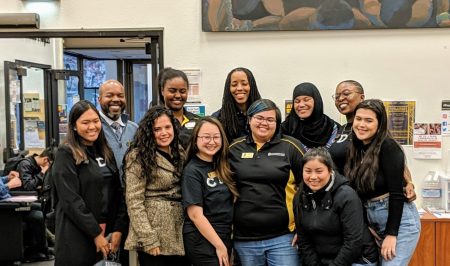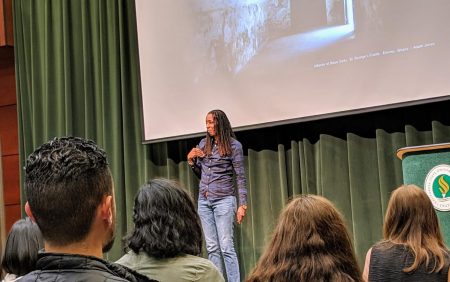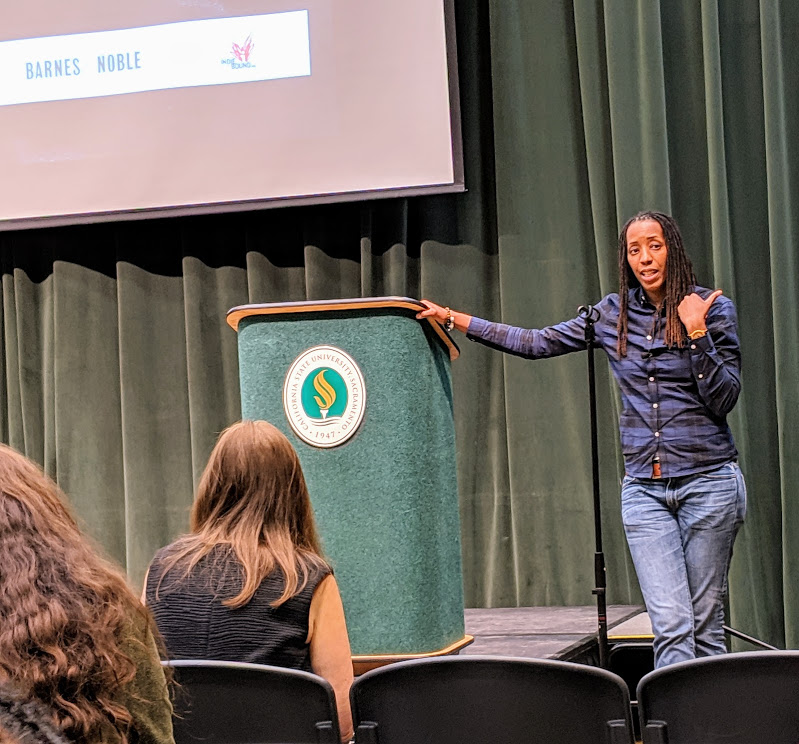Bettina Love speaks about social issues, race, hip-hop and African culture
Roughly 200 Sac State students and faculty attended
Travis Boudreau – The State Hornet
Dr. Love addresses student questions after her speech in the University Union’s Redwood Room. Love’s speech focused on a variety of social issues including the suppression of rights for people of color, LGBTQ rights, abolitionist movements and the cultural relevance of hip-hop on the youth of America.
February 19, 2019
With a message of solidarity and hope, hip-hop scholar Bettina Love delivered a speech in the University Union’s Redwood Room on Monday afternoon.
Love’s speech focused on a variety of social issues including the suppression of rights for people of color, LGBTQ rights, abolitionist movements and the cultural relevance of hip-hop on the youth of America.
Many of the students and faculty who filled the room for Love’s speech did not know much about her work but were interested in what she had to say.
Jazzie Murphy, director of the Academic Advising Center, said that she knew little of Love’s work prior to her visit, but hoped to gain insight and motivation from the speech.
“I’m just really interested to hear what Dr. Love has to say about hip-hop and civics and how that intertwines with education and how that might be able to help me with my students every day,” Murphy said.

Faculty for the Multi-Cultural Center, who hosted the event, gather with Bettina Love during the reception party after the event. Love delivered a passionate speech in the University Union’s Redwood Room on Monday afternoon.
Love began her speech on a somber note by speaking about the history of slavery and the plight that African descendants who came to America had to endure, but her tone quickly shifted to a message of perseverance and hope.
“We talk a lot about the people who died, but we don’t talk about the folks who lived,” Love said. “Somebody in your DNA lived for you, then died for you. They lived for you and that’s the conversation we have to have today to understand that somebody dreamt of you before you were here and they took on the weight to go through all of that for some of us to be here.”
Love followed this by discussing how African culture has not only had a profound impact on modern-day black culture, but has also been integral in developing American culture.
She said that when public education curriculum talks about African-American slaves, their accomplishments of furthering American culture are often times underrepresented and not fully recognized.
“When we talk about these individuals, we talk about them being just slaves. They just worked, oh too bad, too sad,” Love said. “But who do you know has created something out of the most hideous conditions to inspire a full range of music and culture? They did it.”
She went on to list various musical accomplishments that came to America through African culture, including blues music that was created during the slave-era, the rhythm and blues genre that developed during the civil rights movement and hip-hop which formed as a result of the destruction of inner-cities.
One of the primary messages Love conveyed in her speech was the idea of modern segregation. She said that black and brown children go to school with less than one percent of white children.
“We don’t eat together, we don’t break bread together and we don’t go to school together,” Love said. “Our first interactions with each other cannot be hostile interactions.”
For Love, she said it is important for people of different ethnicities, races and sexual orientations to work towards solidarity, to look out for one another and to use their privileges so that others have a chance at success.

Bettina Love gives speech to students and faculty in the University Union’s Redwood Room on Monday afternoon.Love, a hip-hop scholar is socially conscious of inclusion and trying to make sure that everyone’s voice is heard, but understands how difficult that task can be.
After the event, many students and faculty members came away impressed by what Love had to say.
“I thought it was (an) insightful way of looking at how black culture has impacted almost every aspect of our society and who we are today,” Murphy said following the event. “That there needs to be more of a celebration of Black culture and more of a recognition and awareness that I think black students bring.”
Luis Guerrero, a Sac State student in the teaching credentials program said he connected with the hip-hop aspect of Love’s speech.
“What resonated with me was the whole tie-in with hip-hop,” Guerrero said. “I took the class ‘Hip-Hop in Urban America’ here at Sac State and it aligned really well with kind of how she broke it down and what we see in the aspects of hip-hop today. It definitely is part of the DNA and the culture.”
Love, who used to be an elementary school teacher, said she wanted to become a public speaker after she saw all the beauty and potential in black and brown children that wasn’t being tapped into. It drew her out of the classroom and into a teaching education program to help teachers learn how to get the most out of their students.
“My primary message is that black and brown folk are beautiful,” Love said. “That we are smart, we are intelligent and that we are deserving of humanity.”





























































































































